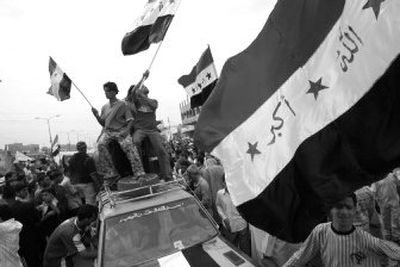U.S.-backed troops continue offensive

BAGHDAD – U.S. warplanes blasted a militia team firing rocket-propelled grenades Saturday, the second day of heavy fighting in a major offensive to drive Shiite Mahdi Army militiamen out of Diwaniyah, a farm-belt city south of Baghdad.
North of the capital, in the increasingly dangerous Diyala provincial capital of Baqouba, police reported finding 21 more bodies dumped in the streets, victims of the intense sectarian warfare. All were shot execution-style and many had been tortured. At least 62 bodies have been found in or near Baqouba since Tuesday.
At least 64 people were killed or found dead across Iraq on Saturday in the eighth week of the U.S.-Iraqi security crackdown on the capital and surrounding cities and towns.
The security committee chief in Karbala province, south of Baghdad, said authorities found the bodies of six shepherds from a group of 22 who were abducted Wednesday, along with their livestock, by suspected al-Qaida in Iraq fighters.
“We have confirmed the 22 shepherds were killed by al-Qaida. We found six of their bodies today and we will continue searching the desert tomorrow,” said Ghalib al-Daami. He would not reveal how he knew all 22 were dead.
Maj. Gen. Oothman Farhood al-Ghanemi, commander of the Iraqi army’s 8th Division, said the U.S.-Iraqi operation to retake Diwaniyah took shape after a three-month crescendo of violence in which at least 58 people were killed or kidnapped.
In violence leading up to the offensive, many women reportedly were killed after the hard-line fundamentalist militiamen accused them of violating their strict interpretation of Islamic morality.
Al-Ghanemi told the Associated Press that militants were armed with rocket-propelled grenades, Katyusha rockets, Strela anti-aircraft rockets and AK-47 assault rifles. Before the offensive, militants attacked Iraqi and U.S.-led coalition forces 17 times with roadside bombs – some of them armor-piercing explosively formed projectiles.
The U.S. military accuses Iran of providing militants with the deadly EFPs.
“Although the army now is in the city, gunmen still have an armed presence. This will take time to finish. We are backed by friendly multinational forces and had it not been for them we would not have been able to detect and dismantle so many roadside bombs today,” the general said.
Al-Ghanemi said the tipping point in Diwaniyah was March 20, when militiamen attacked and set fire to police roadblocks in 15 southeast neighborhoods and turned them into no-go zones for the authorities.
Much of the Diwaniyah police force is said to be controlled by the Badr Brigade, a rival militia of the Supreme Council for the Islamic Revolution in Iraq, the country’s most powerful Shiite political party. SCIRI, as it is known, controls the Qadisiyah provincial council.
Police were ordered off the streets Saturday and some residents said the Iraqi military did not trust them. But Brig. Sadiq Jaafar, the city police chief, said his men were sent indoors because they were too poorly equipped to be of use in the fighting.
An Iraqi army official, speaking anonymously because he was not authorized to release the figures, said three civilians and three Mahdi Army fighters died in the Saturday battle. At least 29 people were wounded – 21 civilians, six Iraqi soldiers and two American soldiers.
The official said U.S. and Iraqi forces captured 36 militiamen.
In its account of Saturday’s fighting, the U.S. military reported only one Iraqi death, that of a militiaman hit in the airstrike. It said three U.S. soldiers received minor cuts in a roadside bombing that destroyed their Humvee.
“Fighting was less steady than yesterday’s actions. Our assessment is that our operations are being effective,” said Maj. Eric Verzola, spokesman for the 4th Brigade Combat Team (Airborne), 25th Infantry Division.
Iraqi police and hospital officials said at least one of the dead civilans and five of the wounded were victims of American tank fire on their home. They had to be pulled from the rubble of their home, and evacuated to Diwaniyah hospital, police said.
The U.S.-Iraqi drive into Diwaniyah – named “Operation Black Eagle” – began before dawn Friday.
The Mahdi Army, the focus of the offensive, is run by radical Shiite cleric Muqtada al-Sadr, who had ordered Baghdad militiamen to lay down their weapons during the security crackdown in the capital.